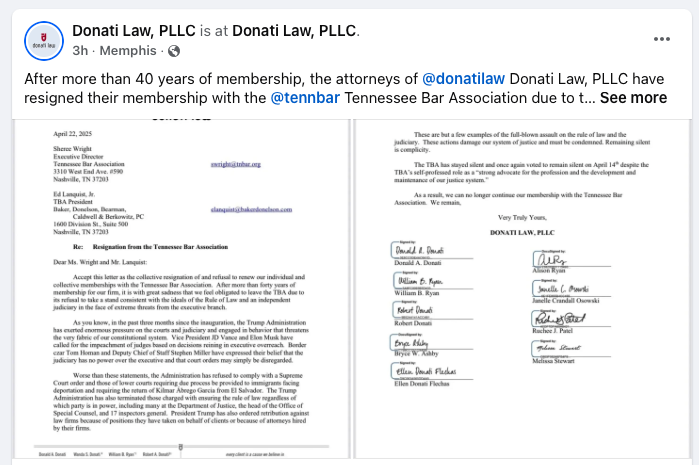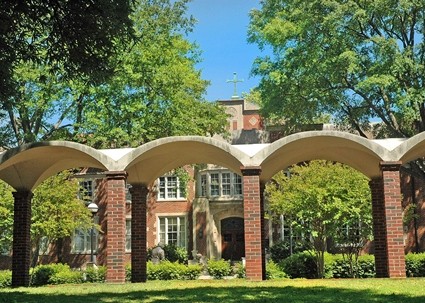A Memphis law firm left the Tennessee Bar Association (TBA) Tuesday after the firm said the group had “voted to remain silent” on President Donald Trump’s actions to erode the rule of law and an independent judiciary.
Donati Law ended more than 40 years of membership with TBA Tuesday in a letter made public on Facebook Wednesday. The Midtown law firm focuses on employment law, personal injury, and criminal defense, according to its website.

”It is with great sadness that we feel obligated to leave the TBA due to its refusal to take a stand consistent with the ideals of the Rule of Law and an independent judiciary in the face of extreme threats from the executive branch,” reads the letter addressed to TBA leaders.
The letter says, specifically, that the TBA “once again voted to remain silent” on April 14. Details of the triggering event on this date were not immediately clear, but Donati attorney Bryce Ashby said it was related to activities from another Memphis attorney, Brian Faughnan, of Faughnan Law.
On his blog, Faughnan on Ethics, Faughnan said many bar associations, like the American Bar Association, have spoken out against Trump actions that erode the rule of law. In an April 8th blog post, though, Faughnan said, ”the Tennessee Bar Association and the Memphis Bar Association have not.”
After private talks with the TBA, he said on April 16, he’d become “more and more convinced that the TBA is actually determined to remain silent in an unforgivable act of cowardice.”
The TBA did not immediately respond to a request for comment on this story. But this story will be updated with their statement if it does.
The Donati letter provides a long list of the Trump-Administration actions that threaten “the very fabric of our constitutional system.” That list includes Vice President JD Vance and Memphis businessman and DOGE frontman Elon Musk calling for the impeachment of judges based on decisions to try to rein in executive overreach. The firm is also wary of Border czar Tom Horan and Deputy Chief of Staff Stephen Miller, who have said that judiciary has no power over the executive branch and that court orders may simply be disregarded.
The list from the firm included the Trump adminstration’s refusal to comply with a U.S. Supreme Court order, as well as those of lower courts that required due process for immigrants facing deportation, and the return of Kilmar Ábrego Garcia from El Salvador.
The firm said Trump has fired “those charged with ensuring the rule of law” including some at the Department of Justice, the head of the Office of Special Counsel, and 17 inspectors general.
Finally, Donati said Trump has ordered retribution against law firms because of positions they have taken on behalf of clients or because of attorneys hired by their firms.
”These are but a few examples of the full-blown assault on the rule of law and the judiciary,” reads the letter. “These actions damage our system of justice and must be condemned.
“Remaining silent is complicity. The TBA has stayed silent and once again voted to remain silent on April 14, despite the TBA’s self-professed role as a ‘strong advocate for the profession and the development and maintenance of our justice system.’ As a result, we can no longer continue our membership with the Tennessee Bar Association.”

